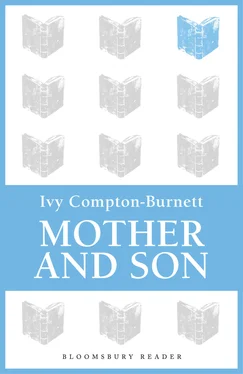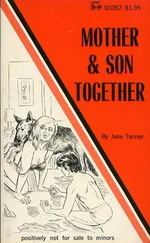Rosebery gave his hand to Julius, and went to the door without looking at the children, as though he recognised he was nothing to them. Adrian spoke before he reached it.
“Shan’t we ever see you again?”
“You did not listen?” said Rosebery, gently. “You did not hear? You will see me when I come to the house. You will be about it, as usual, more than you are now. You see I shall be gone. I shall realise that, when I return; that I am gone.”
Adrian broke into weeping.
“Ah, Adrian, we know your tears, and know they are soon dried.”
“Most tears are,” said Julius. “But some of us do not win them.”
“I want none, Father. Let me leave smiles behind. I know they smile at heart.”
“You know too much,” said Francis. “And we do not know enough. Why cannot you visit your father and return?”
“Return where?”
“Here, where you have spent your life.”
“Yes, it is late to begin again,” said Rosebery, in a quiet tone.
“What do you feel about his going?” said Alice to Francis.
“I believe I feel grief.”
“And I feel alarm. The family will be too small. We shall not be enough for Uncle.”
“Does Uncle love Rosebery?” said Adrian.
“Yes, in a way. He was his father for too long. He will never lose all the feeling.”
“And absence will make his heart grow fond,” said Francis. “The thought of it makes mine do so.”
“I believe my heart was always fond,” said Alice.
“Have you your father’s letter?” said Julius to Rosebery.
Rosebery handed it to him.
“There is no address. I thought there might be none. After all these years there would hardly be one.”
“Let me see the letter, Father.”
“You knew it; you must have known. How could you make your plans, if you did not know your destination?”
“I had made no plans. There was need of none. I was going to the writer of the letter, wherever it might be. And I will go. Something will guide my steps.”
“What can do that?” said Alice.
“Nothing you would know, no voice that you would hear.”
“Well, listen to the voice,” said Julius, “and tell me where to send your letters and anything else you will need.”
Rosebery sat down and covered his face with his hands.
“Father, you will not believe me. But I did not think of the address. It mattered nothing to me where it was, what it was; I was simply going to it. Until I set forth, I had no need to know it. But how can you believe such a word?”
“I believe it, my boy. No one else would do so. I wonder at myself, but I find it true. You did not think of going, until you felt urged to make a scene. And then the thought did its own work.”
“I meant to go, Father.”
“You would have gone and returned. Though perhaps not before your father’s death.”
“He can’t go now,” said Adrian to Alice.
“No, he must stay here. It is the only address he knows.”
“Are you glad he is not going?”
“Hardly as glad as I thought I should be.”
“I think that shows you are glad.”
“Well, our life will be easier with him. We recognise what he does for it.”
“Haven’t we done him justice?”
“No, we have only just begun to do it. And no one could ever do him enough.”
“I have never known anyone who needed so much,” said Francis.
“I think he likes it as well as needs it,” said Adrian.
There was a silence.
“Father, will you join us in a game of cards?” said Rosebery, drawing out a chair. “We only need four players, but Adrian will make no demur to being left out.”
“Will nothing else absorb Rosebery’s energy?” murmured Francis. “If only Aunt Miranda were alive!”
“Francis, that will be the epitome of my life.”
“Would she have liked us to play cards?” said Adrian.
“Was it that doubt, that prevented your playing?” said Rosebery, with a smile. “I can relieve you of it. She taught me to play herself, when I was a boy.”
“And now has left him partnerless,” murmured Francis.
“And now has left me as you say, Francis,” said Rosebery.
THE END
Ivy Compton-Burnett was born in Middlesex in 1884. Compton-Burnett was encouraged by her liberal and unorthodox father, homeopath Dr Burnett, to prepare to read classics at London university (neither Oxford nor Cambridge gave degrees to women at this time). She had dearly loved her father, who died without warning from a heart attack in 1901 when she was sixteen. Her closest brother died three years later, and Ivy Compton-Burnett went on to lose three more of heryounger siblings and her mother by the time she was 35, something she could hardly bear to speak about, but constantly explored in her novels.
Compton-Burnett published twenty novels, the first while she was in her twenties, in 1911. However, the first of her works to use her mature and startlingly original style was published when she was forty, in 1925. Compton-Burnett's fiction deals with domestic situations in large households which, to all intents and purposes, invariably seem Edwardian. The description of human weaknesses and foibles of all sorts pervades her work, and the family that emerges fromeach of her novels must be seen as dysfunctional in one way or another.
She was named a Dame Commander of the British Empire in 1967, two years before her death in 1969.












